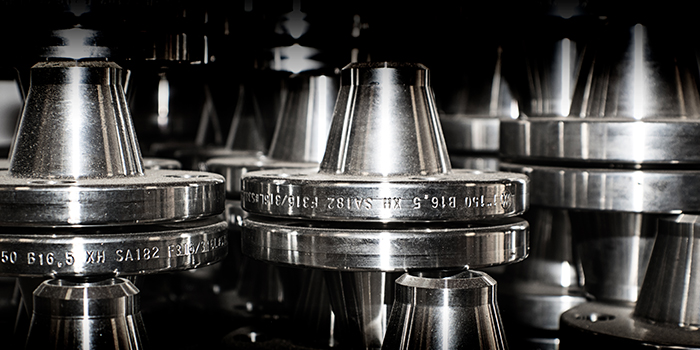How Different Alloys Change Steel’s Properties

Mar 20, 2015
Architects and manufacturers have used steel for hundreds of years because of its strength and durability. And until recently, any steel would work for these creators’ needs. Their steel didn’t have to withstand the high temperatures and pressures that steel endures today. These modern demands make steel alloys necessary in nearly all industries and applications.
Steel alloys have different properties than steel alone. They still have steel’s strength and durability, but in some cases they multiply it, and other some cases they add new properties altogether. You can find a more thorough breakdown of different alloys’ properties below.
1. Steel-Aluminum Alloys
Aluminum deoxidizes and degasifies steel, which controls the steel’s grain size and makes it finer. When used in conjunction with nitrogen, aluminum can turn steel into a uniformly hard casing. Aluminum helps steel form more slowly, which means you can make aluminum-steel alloys into more intricate parts. It also makes steel lighter.
2. Steel-Carbon Alloys
Carbon raises steel’s tensile strength, making it harder, less ductile, tougher, and more resistant to wear and tear. Depending on how much carbon the manufacturer adds, the steel could have varying degrees of strength and hardness.
3. Steel-Chromium Alloys
Chromium, also called chrome, represents the second primary ingredient in stainless steel. When you add chromium to steel, it boosts steel’s performance in several ways. On the one hand, it makes it harder and tougher. It also makes the steel’s grain finer and makes it resistant to scratching, staining, rusting, and denting. It also hold steel’s shape at higher temperatures and gives it a distinctive silvery gloss.
4. Steel-Cobalt Alloys
You probably know that metal tends to become more malleable at higher temperatures. This can prove disastrous or even dangerous in certain circumstances, like manufacturing. Luckily, manufacturers can turn to steel-cobalt alloys for a safe solution. Cobalt reinforces steel’s strength, and it maintains that strength at high temperatures. This makes it ideal for use in cutting tools.
When combined with nickel and aluminum, steel-cobalt alloys also create powerful alnico magnets.
5. Steel-Copper Alloys
You don’t usually find steel alloys with copper deliberately added, but when manufacturers do add it, it creates precipitation hardening properties.
6. Steel-Lead Alloys
Lead improves steel’s machining characteristics. It reduces friction where working edges contact each other, and it improves chip breaking formations.
7. Steel-Manganese Alloys
If you want particularly powerful steel, you opt for steel-manganese alloys. By itself, manganese has brittle, but extremely strong properties. It cools slowly, and once it cools, it proves quite difficult to cut.
Wear also makes the surface even harder. So if you need to cast ore crushers or railways crossings, opt for manganese steel.
8. Steel-Molybdenum Alloys
Molybdenum, like manganese, cobalt, and chromium, also improves steel’s strength. It adds hardness, and it enables steel to withstand higher temperatures and more forceful shocks. It also gives steel the added benefit of creep resistance. You’ll often find this alloy in automobile parts and high grade machinery.
When used in conjunction with other alloy materials, it intensifies their effects.
9. Steel-Nickel Alloys
Nickel functions similarly to manganese when alloyed with steel. It increases the material’s strength and hardness, but doesn’t make it less ductile. Nickel helps steel resist rust, and it gives steel more elasticity. This means that when forces hit it, it can bounce back into its original shape. When used with chromium, it allows stainless steel to resist corroding at high temperatures.
10. Steel-Nitrogen Alloys
Nitrogen boosts steel’s stability and yield strength. This makes the alloy less breakable as a whole.
11. Steel-Phosphorus Alloys
By itself, phosphorous simply improves steel’s strength and resistance to corrosion. However, it can also make steel more susceptible to cracking, so manufacturers typically use it in conjunction with manganese and sulfur. We’ll sulfur’s strengths more below.
12. Steel-Silicon Alloys
Like aluminum, silicon deoxidizes steel, which makes it stronger overall. It also increases steel’s magnetic permeability.
13. Steel-Sulfur Alloys
When you pair steel and sulfur, the resulting material has little weldability and ductility. It also has less impact toughness, so it’ll crack with sufficient force. It does have improved machinability though, and when you use it with manganese, it loses all of its disadvantages.
14. Steel-Titanium Alloys
Titanium has a reputation as a tough metal by itself. When you combine it with steel, another tough metal, you create something even stronger. Manufacturers usually inject carbon into the reaction when they create titanium steel, and the resulting metal has incredible strength and corrosion resistance.
15. Steel-Tungsten Alloys
Like chromium and cobalt, tungsten maintains steel’s strength at high temperatures. It also improves the material’s strength overall. The material not only stays hard, but it isn’t brittle either. Its toughness prevents it from breaking after enduring powerful forces.
16. Steel-Vanadium Alloys
Vanadium by itself has brittle properties, but when you combine it with steel, the resulting material doesn’t have this weakness. You end up with a fine-grained steel that can resist great shocks, so you’ll often find it in vehicle springs, gears, and other parts that vibrate constantly.
Now that you know a little more about steel alloys, you know what alloyed elements to look for the next
time you need steel in an application. Call your local manufacturer to get the steel alloy you need for your next project.
About James Duva Inc.
Since 1978, James Duva Inc. has been your trusted source for stainless steel and high-nickel alloy industrial products. Whether you’re in the water treatment, process or power industry, we pride ourselves on always having what you need. Say goodbye to your sourcing problems with just one call to James Duva.
